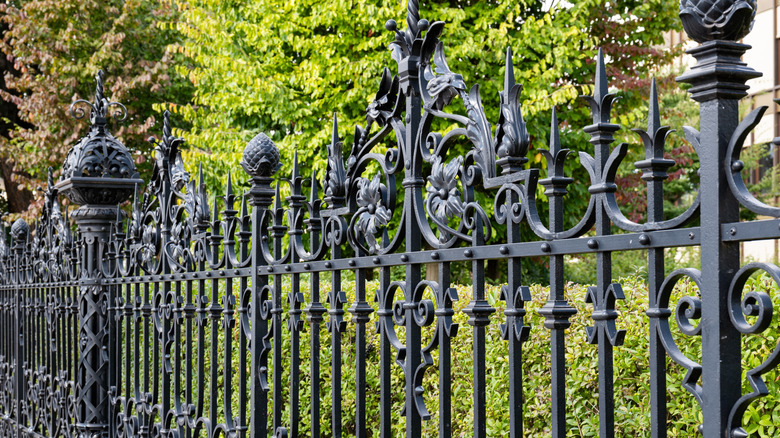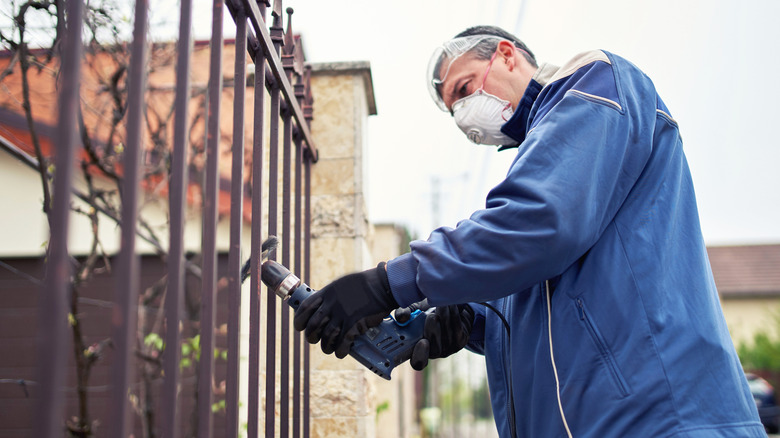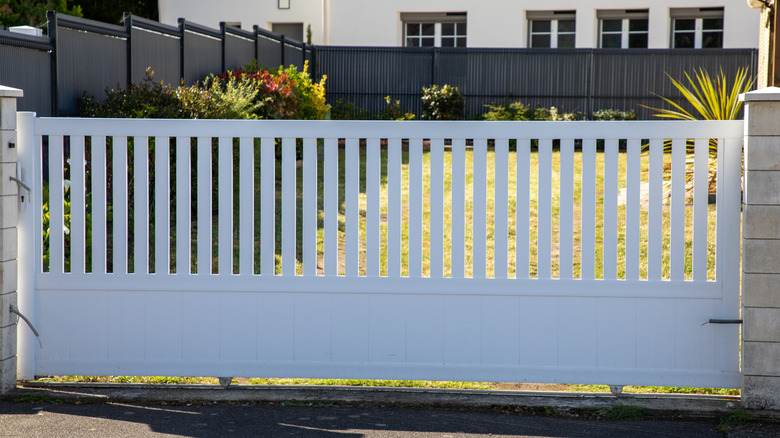The Disadvantages Of A Wrought Iron Fence To Know Before Installing
Durability, security, and, of course, visual appeal — these are some of the main characteristics many homeowners search for in fencing materials, and wrought iron provides a healthy balance of those qualities. However, you should know there are certain downsides to these metal fences that might keep you from installing them. While wrought iron barriers are a great choice, they have drawbacks like high cost, lower availability, tendency to rust, difficult installation, and possible privacy issues.
Despite its many benefits, wrought iron's susceptibility to rust is a particularly unwanted trait. The corrosion is completely normal as rust is caused by iron's exposure to air and moisture over a long period, which means it's also inevitable. Rust spots on these fences can affect their beauty, and if left unmaintained, it could cause structural weakness and damage. Unfortunately, to prevent your wrought iron fences from rusting, you'll encounter another con of these fences which is high maintenance. Contrary to what you would expect from a metal fence, this one needs regular care to remain in good shape and last long.
Although this isn't always the case, wrought iron fences tend to compromise privacy. This happens when you opt for the popular open design that helps accentuate the property within, but also allows people passing by to see through the barrier. While this issue can be easily solved by adding panels or greenery to cover the gaps, it's still extra work that you have to do to upgrade your wrought iron fence.
Cost and installation drawbacks of wrought iron fences
A wrought iron fence might not even make it to your final list if you're on a tight budget. Sure, it's one of the fencing options that help boost your curb appeal, but it's also one of the most costly, especially compared to other metal fence materials. If you have a large yard it can be a major investment. While a foot of steel and aluminum fences could cost between $7 and $32, wrought iron fences average $24 to $34 per foot. And that's just the cost of the material, not installation. Further, wrought iron can be heavy. Setting up a fence with it is not exactly a DIY project because it needs to be hand-welded. You'll need an expert to install it, and the cost can add another $15 to $25 per foot.
Wrought iron can also be difficult to find. You see, another downside of these fencing options is their availability, or in this case, a lack thereof. Due to the rise of cheaper gates that are easier to produce and maintain, wrought iron is falling down the pecking order. Plus, authentic wrought iron fences are handcrafted, and while this makes it a very unique choice, it also contributes to why these barriers are getting rarer by the day. Furthermore, they are incompatible with graded yards, so there's the extra task of installing the fence in a stepped-up manner, which takes a bit away from its overall aesthetics and adds to installation costs.
Possible alternatives to wrought iron fences
As much as wrought iron fences can be great, no one will blame you if you decide to look at alternatives. If you're in the market for metal fences, you should consider options like aluminum or steel. Aluminum fences are rust-resistant and even when they get wet, a protective film produced by the resulting oxidation helps prevent corrosion. This makes these fences great options for areas with high humidity or frequent downpours. They also remove the headache of stressful installation thanks to their lightweight nature.
Another option is a steel fence, particularly galvanized steel. Galvanization is a huge game changer in fence construction thanks to the addition of a zinc coating that offers anti-corrosive properties, giving you a structure that can last. Galvanized steel fences are durable and require low maintenance to ensure sustained performance and quality. Besides galvanization, a powder-coated steel fence can act as a good substitute. Similarly, it's a fence coated with anti-corrosive materials but this time, in the form of a powder that consists of ground pigments and resins.
However, you should note that these alternatives have one or two downsides of their own, so be sure to know what's most important to you before going fence hunting. For example, aluminum fences are not as strong as steel or wrought iron and can dent or bend, while steel fences are heavy, making DIY installation a no-go.


